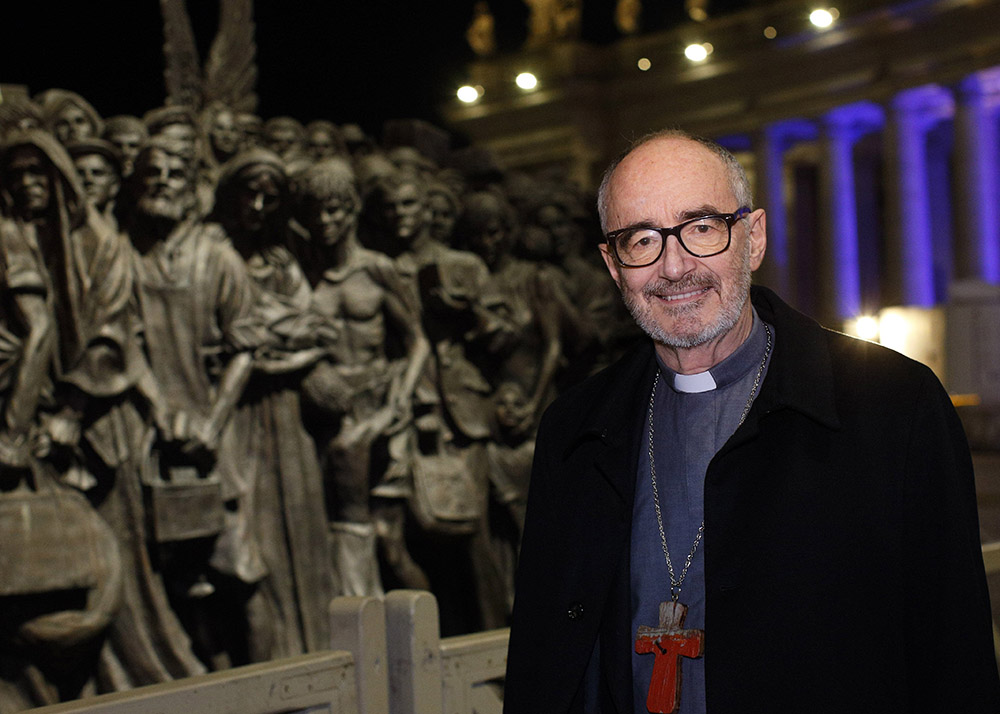
Canadian Cardinal Michael Czerny, undersecretary for migrants and refugees at the Vatican Dicastery for Promoting Integral Human Development, poses for a photo at the "Angels Unawares" statue in St. Peter's Square at the Vatican Dec. 15, 2020. (CNS/Paul Haring)
At a time when some lawmakers are seeking to distance themselves from America's founding principles, one of Pope Francis' closest advisers, Jesuit Cardinal Michael Czerny, is encouraging U.S. Catholic leaders to reclaim the words on the Statue of Liberty and make them part of their own mission.
"The Statue of Liberty still stands, even when some federal, state or local leaders are hostile towards immigration," said Czerny on Sept. 21. "The Church can step in and add her voice to hers in proclaiming: 'Give me your tired, your poor, Your huddled masses yearning to breathe free,' " he said, quoting from the Emma Lazarus poem mounted on the iconic landmark's pedestal.
Czerny's remarks came during a wide-ranging lecture addressing themes related to the peripheries, migration and the COVID-19 pandemic at the ninth biennial Mission Bishops' Conference hosted by Catholic Extension in Chicago, according to a prepared text provided to journalists.
The Czechoslovakian-born Canadian cardinal is the undersecretary of the Migrants and Refugees Section of the Vatican's Dicastery for Promoting Integral Human Development. During his lecture, "Building a Church that Goes to the Peripheries," Czerny sought to draw lessons from all of Francis' major encyclicals and apostolic exhortations over the last eight years and apply them to the American context.
"No one is useless, in the words of Fratelli tutti, and no one is expendable," he said, citing the pope's October 2020 encyclical. "Each of us, moreover, can learn something from others. This means finding ways to include those on the peripheries of life."
"I invite you to recall exclusion and periphery in your own experience and what you have observed, perhaps in the poor, remote and under-resourced dioceses you have known. Was a line drawn between 'us' over here and 'them' over there?" he asked.
In addressing migration, the cardinal encouraged an approach that addresses the push factors of immigration.
"Before the right to migrate, states should guarantee the right not to have to migrate," he said. "All people must have the right to remain in their homelands, living lives of dignity, peace, and security."
Yet he went on to note that the Gospel requires migrants to be welcomed with openness and hospitality.
"Let's think for a moment about all those borders. They are human contrivances, and we have to be careful," he said. "God did not draw those lines. God did not say 'I want everyone with this skin color over here and everyone with that accent over there.' God does not indulge in us versus them distinctions."
The cardinal went on to specifically name the United States' own tragic history of racial injustices, reminding those in attendance to not forget this past and to allow it to motivate future change.
"You know the immense importance of integration and the continuing tragedies of segregation. Whether we're talking about people within this country striving for acceptance and fair opportunity or about newcomers seeking a better life, let us admit that if we welcome, protect and promote, the job is not finished," he said.
Advertisement
"Integration is always a two-way process, based on openness, on appreciative encounter, and recognition of the other's spiritual and cultural richness," he continued. "It's that marvelous two-way movement from knowing about one another, to actually knowing one another; from helping other people meet their needs, towards the care of kith and kin. To integrate aims ultimately at friendship. That is the blessed state that Pope Francis constantly encourages everyone to pursue."
Catholic Extension, which works to support Catholic communities in the poorest regions of the country, has been in demand over the last 18 months of the pandemic. The cardinal paid tribute to the essential workers, many of whom are migrants, refugees and seasonal workers, who put their own lives at risk to keep society running.
"They were taken for granted and rarely noticed until COVID stopped them from working or from even crossing a border to reach the workplace," he said.
He went on to criticize those who have used the pandemic to scapegoat migrants during the health and economic crises.
"Too often during the pandemic, migrants and refugees have been demonized, blamed for spreading sickness, with loud voices claiming that keeping 'us' safe means keeping others out."
"COVID-19 has exposed some of the major fault-lines in society — the pathologies of individualism and indifference that give rise to grave and growing inequality, unrelieved and unrelenting sufferings, too many scandalous reasons for despair, and the despoliation of our common home," he lamented.
In charting a vision for the future, Czerny said Francis' vision of a church engaged in a synodal process, of bringing diverse perspectives and backgrounds and learning to live in community together, is the only way forward.
"Neither the Church nor the world can be repaired if the terrible oppositions persist: indigenous peoples versus settlers, women against men, cities depopulating the rural countryside, North-vs-South and so on," he said.
"So the vision of Pope Francis for the Church is not like a landscape, much less a portrait; rather it is more like unfolding and converging paths; and you don't so much think as walk your way into being Church," he added. "To be Church is to synod."








